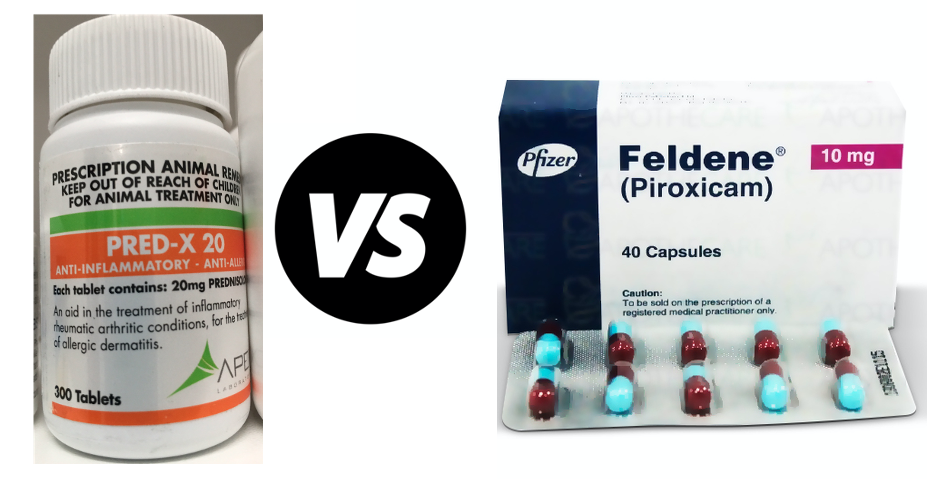Prednisolone or piroxicam. Which one should I choose for pets with cancer?
Prednisolone (or prednisone) is a corticosteroid, while piroxicam is a non-steroidal anti-inflammatory drug (NSAID). Both medications have anti-inflammatory properties, but which one is best for pets with cancer?
This is a common question asked by many vets, and the answer depends on the individual needs of the pet at the time. Here are some answers to some ‘Frequently Asked Questions’ to guide you in your decision.
Prednisolone
When can I use prednisolone?
Prednisolone can be used in any sick pet from cancer. Anti-inflammatory dosages can reduce the inflammatory cytokine release associated with cancer and make sick pets feel clinically better within 24 to 48 hours. Therefore, prednisolone can be used to decrease inflammation, swelling and discomfort associated with many cancers in pets (such as brain tumours).
For some cancers (such as lymphoma, leukaemia, mast cell tumours and multiple myeloma), immunosuppressive dosages of prednisolone can potentially kill cancer cells (i.e. shrink the tumour). However, the duration of response is often short-lived.
After a diagnosis, prednisolone can also be used to treat hypercalcaemia, which is a paraneoplastic condition that can be life-threatening if left untreated.
Prednisolone can be used alone or in combination with many other anti-cancer therapies. However, it should not be administered concurrently with NSAIDs, and it should not be administered on the same days as Palladia® (toceranib). Combining them can cause life-threatening gastrointestinal ulceration.
What are the potential side effects of prednisolone?
- Lethargy
- Polydipsia and polyuria
- Polyphagia
- Excessive panting
- Potbellied appearance
- Behavioural changes (such as excitability or agitation)
- Gastrointestinal signs (such as diarrhoea and melaena)
- Increased susceptibility to infections (such as pyoderma or lower urinary tract infections)
- Muscle wastage and weakness
- Thinning of skin and dull coat
- Hyperadrenocorticism (particularly with chronic use)
If side effects impact the pet’s quality of life, the dosage or frequency should be reduced and/or gastroprotectants considered. If the pet has been on prednisolone for more than two weeks, it is essential that owners do not suddenly stop prednisolone. Prednisolone is a hormone that is normally released from the adrenal glands as part of the body’s normal response to stress. Long-term administration of prednisolone can reduce the function and size of the pet’s adrenal glands. If prednisolone is suddenly discontinued, pets can go into a life-threatening adrenal gland crisis (i.e. hypoadrenocorticism).
Piroxicam
When can I use piroxicam?
Piroxicam has less potent anti-inflammatory properties than prednisolone. If you have a sick pet from cancer, prednisolone is usually a better choice.
However, in pets with normal renal function, there are certain cancers where piroxicam has shown anti-cancer activity and is clinically indicated, including:
- Transitional cell carcinoma in dogs
- Prostate carcinoma in dogs
- Dermal and nasal planum squamous cell carcinoma in dogs and cats (particularly if solar-induced)
- Dermal haemangiosarcoma in dogs (particularly if solar-induced)
- Oral squamous cell carcinoma in dogs and cats
- Other carcinomas (such as mammary carcinoma, nasal carcinoma and apocrine gland anal sac adenocarcinomas in dogs)
Piroxicam's anti-cancer effects may be due to inhibition of angiogenesis, inhibition of cyclooxygenase-2 (COX-2) and/or immunomodulation. Some carcinomas that are COX-2 negative can also responded to piroxicam.
Piroxicam can also provide pain relief to pets with osteoarthritis.
Piroxicam can be used alone or in combination with many other anti-cancer therapies. However, it should not be administered concurrently with prednisolone, and it should not be administered on the same days as Palladia®. Combining them can cause life-threatening gastrointestinal ulceration. Moreover, piroxicam should always be administered with food.
What are the potential side effects of piroxicam?
- Lethargy
- Gastrointestinal signs (such as inappetence, vomiting, diarrhoea and melaena)
- Nephrotoxicity (that can sometimes be irreversible)
- Hepatopathy
- Coagulopathy
Piroxicam alone can be administered safely in tumour bearing cats long-term. Gastrointestinal toxicity (primarily vomiting) is usually mild and transient within the first month of therapy. Renal and hepatic toxicity is rare. However, if piroxicam is used in combination with other forms of therapy such as radiation therapy, chemotherapy or Palladia®, it may lead to a higher rate of toxicity.
Piroxicam alone can be administered safely in tumour bearing dogs long-term. Occasionally, it can be associated with significant gastrointestinal side effects or lead to renal or hepatic toxicity. However, if piroxicam is used in combination with other forms of therapy such as Palladia® or metronomic cyclophosphamide and frusemide, it may lead to a higher rate of toxicity.
If side effects impact the pet’s quality of life, the frequency should be reduced, gastroprotectants considered, or the medication temporarily or permanently discontinued.
Why do you recommend piroxicam and not another type of NSAID?
Piroxicam has been studied more extensively than other NSAIDs for pets with cancer, particularly carcinomas like transitional cell carcinoma and squamous cell carcinoma, so it is my NSAID of choice. There is no (or very little) data in pets with cancer to know whether meloxicam or other NSAIDs will have the same potential benefits as piroxicam. However, if pets do not tolerate piroxicam, other NSAIDs can be considered.
Vets, I hope this information is helpful in deciding which anti-inflammatory you should use in pets with cancer. If you have a question about prednisolone or piroxicam, or have a pet that you think may benefit from prednisolone or piroxicam, please do not hesitate to get in touch by clicking here.

